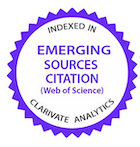A política do Conselho Nacional de Desenvolvimento Científico e Tecnológico (CNPq) para a concessão de recursos: o caso da cadeia produtiva do leite
Resumo
Foram analisadas as políticas de Ciência e Tecnologia do Conselho Nacional de Desenvolvimento Científico e Tecnológico (CNPq) relativas ao projeto Plataforma Tecnológica do Leite financiado pelo CNPq por meio do Programa de Desenvolvimento Científico e Tecnológico (PADCT) e executado pela Empresa Brasileira de Pesquisa Agropecuária (EMBRAPA) – Gado de Leite, que objetivou estabelecer as principais técnicas na cadeia produtiva do leite, bem como suas possíveis soluções. PALAVRAS-CHAVE: Bovinocultura do leite, cadeia produtiva, restrições técnicas.Downloads
Não há dados estatísticos.
Downloads
Publicado
2006-10-30
Como Citar
SILVEIRA, Maria Auxiliadora da; NUNES, Romão da Cunha; VERNEQUE, Rui da Silva; LEITE, Rômulo Cerqueira; BORGES, Iran. A política do Conselho Nacional de Desenvolvimento Científico e Tecnológico (CNPq) para a concessão de recursos: o caso da cadeia produtiva do leite. Ciência Animal Brasileira / Brazilian Animal Science, Goiânia, v. 6, n. 2, p. 61–65, 2006. Disponível em: https://revistas.ufg.br/vet/article/view/360. Acesso em: 11 fev. 2026.
Edição
Seção
Produção Animal
Licença
Copyright (c) 2006 Ciência Animal Brasileira / Brazilian Animal Science

Este trabalho está licenciado sob uma licença Creative Commons Attribution 4.0 International License.
Autores que publicam nesta revista concordam com os seguintes termos:
- Autores mantém os direitos autorais e concedem à revista o direito de primeira publicação, com o trabalho simultaneamente licenciado sob a Licença Creative Commons Attribution que permite o compartilhamento do trabalho com reconhecimento da autoria e publicação inicial nesta revista.
- Autores têm autorização para assumir contratos adicionais separadamente, para distribuição não-exclusiva da versão do trabalho publicada nesta revista (ex.: publicar em repositório institucional ou como capítulo de livro), com reconhecimento de autoria e publicação inicial nesta revista.
- Autores têm permissão e são estimulados a publicar e distribuir seu trabalho online (ex.: em repositórios institucionais ou na sua página pessoal) a qualquer ponto antes ou durante o processo editorial, já que isso pode gerar alterações produtivas, bem como aumentar o impacto e a citação do trabalho publicado (Veja O Efeito do Acesso Livre).


























